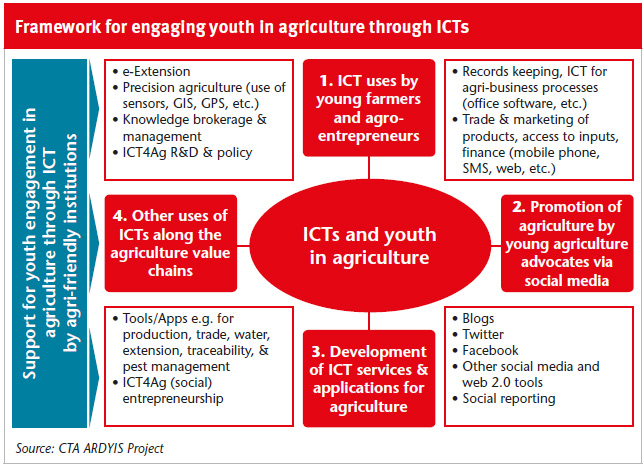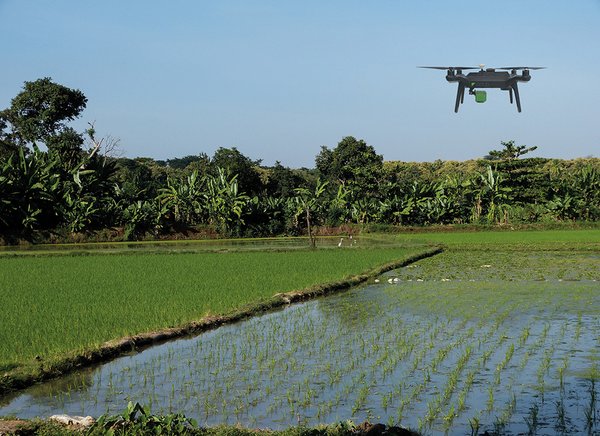 Download this article in magazine layout
Download this article in magazine layout
- Share this article
- Subscribe to our newsletter
From agricultural finance to drone operations: Starting off a new generation of agripreneurs
October 2013, in Kigali, Rwanda. David and Gerald, two young people from Uganda, have just won a software competition organised by the Technical Centre for Agricultural and Rural Cooperation (CTA) with their agricultural finance management application Ensibuuko (now called MOBIS). April 2017, four years later, in Malawi and Zambia. With great anticipation, the two friends have launched a franchise service of MOBIS in the capital of Lilongwe. Thousands of farmers have already been benefiting from MOBIS’s services in Uganda through agricultural co-operatives. Now Ensibuuko is an established business with several employees and generates revenues daily. The entrepreneurs are dreaming of scaling up throughout Africa, improving access to finance and increasing income for millions of farmers …
This brief story illustrates part of the CTA vision regarding the multilevel benefits that can blossom from involving young people (aged up to 35 years) in the agricultural sector through ICTs. This vision has been framed in the organisation’s Youth in Agriculture strategy, developed in 2013, which has defined four goals around which CTA has been supporting youth:
- promote coherent evidence-based policies on youth in agriculture and rural development;
- enhance the engagement of youth in agricultural value chains;
- enhance youth engagement in agriculture through ICT innovation and utilisation and knowledge management; and
- strengthen the engagement of young professionals in agricultural science and tertiary education.
Values and approaches for engaging youth in agriculture using ICTs
Indeed, it has become urgent to harness multi-dimensional strategies and efforts to increase the involvement of the younger generation in agricultural value chains. The aging population of the farming sector, coupled with the relative readiness of the agrifood sector, compared to other sectors, to provide a range of jobs to a significant share of the youth population, constitute key justifying factors. For example, 60 per cent of young people in Africa are either without work, not studying, or engaged in irregular employment (Global Entrepreneurship Monitor, 2015), while about twelve million of them enter the job market every year without many opportunities.
In line with the third goal of its youth strategy referred to above, the ARDYIS (Agriculture, Rural Development and Youth in the Information Society) project of CTA, which has been promoting ICT use by youth in agriculture since 2010, has designed a four-pronged framework for engaging them leveraging on digital technologies. The first approach relates to the use of social media to promote agricultural opportunities, and the second one focuses on enhancing ICT use in youth-led farming and agribusinesses, in order to improve market access and business processes. The third approach relates to the development of ICT services targeting the agricultural sector by young entrepreneurs, and the fourth one encourages upgrading ICT use in all other agricultural professional areas in which youth can be involved, particularly in extension, agricultural knowledge management, etc. CTA has been implementing a variety of activities within that framework (AGRA 2015, Chapter 4).
The AgriHack Talent programme
An initiative of CTA which has been specifically supporting youth ICT innovation and entrepreneurship in agriculture is the AgriHack Talent programme. It includes five components: competitions to develop ICT applications for agriculture (hackathons) when there is a need, a start-up competition targeting companies already offering services, capacity building, mentorship and incubation opportunities, promotional and networking opportunities, and facilitation of access to grants and investments to implement and scale-up services offered.

Successful start-ups have already evolved from the AgriHack programme. For example, the Ugandan MOBIS platform referred to above was developed during the first hackathon organised by CTA. FarmDrive suite of applications, another platform that emerged from a hackathon, is now successfully operated as a business in Kenya. The start-up owner of this firm has helped farmers access to loans through improved creditworthiness and linkages with financial service providers. They are internationally recognised as an innovative financial service company.
After organising a series of hackathons, CTA decided to concentrate efforts on existing applications and services, in order to facilitate their maturation and scale-up. An e-agriculture start-up competition (dubbed Pitch AgriHack) focusing exclusively on youth-led companies was organised in 2016. Acknowledging the value of this activity, the African Development Bank (AfDB) decided to join forces with CTA and provided financial and logistics contributions for the event. Other partners involved included the ICT incubator mLab East Africa in Kenya, the venture capital firms ProHaus Group (from USA) and Devlabs (from Latin America), the African Agribusiness Incubator Network (AAIN) and many more. The competition was open in two categories: Early stage category (targeting prototypes at early stage) and Advanced stage category (targeting services already in operation and generating revenues). A total of 152 applications were received from 30 African and Caribbean countries, and eventually, 25 finalists were selected by an international panel (see Box). The finalists took part in a bootcamp in Kenya in November 2016, and items they benefited from included capacity building in e-agriculture business operations, financial model design and tips on raising capital.
The winners of Pitch AgriHack 2016
Out of the 25 finalists, ultimately seven winners were selected, all of them already operating. Four main winners won grants offered by CTA (between 5,000 and 15,000 euros) to help them scale their services:
• Sooretul (Senegal) – a web marketplace for agricultural processed products offered by women co-operatives.
• Brastorne Enterprises (Botswana), with the mAgri platform – a USSD application that gives farmers access to relevant information and to a mobile marketplace. It is already serving 150,000 users.
• Daral Technologies (Senegal) – a livestock application which provides alerts and a management system.
• MobFit (Uganda) – a GSM-supported agricultural supply chain software connecting smallholder farmers and buyers.
Other winners were selected by the partner ProHaus Group, and they will benefit from investments and capacity building opportunities: Kuza from Kenya, Agro-Centa from Ghana and FarmAfriQue from Nigeria.
So far, some 600 young innovators and entrepreneurs have been involved in the hackathons and start-up competitions. More than 20 ICT hubs or institutions from 15 countries have been involved (such as Outbox Hub from Uganda which supported Ensibuuko or Wennovation Hub from Nigeria). The programme has engaged with institutions such as ministries in charge of ICT and agriculture, AfDB, regional organisations (including the Alliance for a Green Revolution in Africa, the AAIN, the Caribbean Agricultural Research and Development Institute (CARDI), the Southern African Confederation of Agricultural Unions) and the private sector (e.g. Microsoft, ProHaus Group and Telesur). The best start-ups involved so far have benefited from about one billion US dollars (investment and grants from various national and international parties). Several hundreds of thousands of farmers have been reached by the services provided.
Drone-based advisory services for smallholder farmers
There is a general consensus that smallholder farming needs to become more productive, more sustainable and more profitable. Unmanned Aerial Systems (UAS) – or drone-based systems – services can help make this possible by bringing some of the tools of precision agriculture to producers, which include large and medium-scale holdings and associations of small-scale farmers growing the same crop in contiguous areas. Typically, UAS services are provided by entrepreneurs who invest in the equipment, learn the skills to use it, conduct or sub-contract data analysis, interpret the findings and advise their customers.
UAS can inform a range of services, including mapping and surveying (e.g. farm boundary delineations, crop area calculations, elaboration of digital elevation models and more), crop inventory (e.g. count of tree crops, yield estimations), crop scouting (e.g. identification of location-specific crop stress, assessment of biomass development, etc.), crop damage assessment (e.g. for insurance purposes), crop management advisory (e.g. nitrogen application – on selected crops where solutions are available), infrastructure inspection (e.g. irrigation systems, farm to market roads, etc.), and increasing farmers’ credit-worthiness via the integration of far profiles with high resolution, accurate and up-to-date data sets.
UAS can thus help increase the returns to farmers and create knowledge-intensive new employment opportunities in rural areas, offering educated rural youth an alternative to migrating to the cities. CTA recognised these opportunities, partnered with leading private sector operators, and assisted ICT start-ups in Benin, Ghana, Tanzania, DRC and Uganda in acquiring the capacity for delivering UAS services. This materialised in 2017 via a series of activities including training in operating drones and mounted multispectral sensors, understanding safety and privacy principles and regulations, managing and processing remote sensed data, developing a business plan and networking. In addition, CTA provided some financial support for the acquisition of necessary equipment. Technically competent and entrepreneurial youth-led enterprises have diversified the range of their ICT4Ag services and are now in the process of entering into contractual arrangements with agro-enterprises, farmers’ associations, development agencies, research institutions and seed companies to start with. A growing community of practice (UAV4ag) and dedicated social media spaces on Twitter and Facebook underpin the initiative.
… but still a need for support
Unfortunately, but quite understandably, the ICT4Ag business sector in developing countries in particular (and beyond) is still emerging and requires a lot of support. In general, entrepreneurship is a challenging endeavour in those countries, as illustrated notably in the Doing Business Reports of the World Bank. A large share of the young entrepreneurs there have not studied or do not have knowledge of business management. Business ecosystems, including government support facilities, are weak, and access to capital is a daunting issue that severely limits growth potentials. More specifically, the market (customers) for ICT4Ag services, though young and developing, is to an important extent not solvent when only farmers are targeted. Conversely, as reported in the World Bank report Growing Africa: Unlocking the Potential of Agribusiness, the African food market will create a one trillion US dollar opportunity by 2030. E-agriculture services are part of such opportunities.
For all these reasons, and also to address the crucial employment issues faced by the younger generation, more support is needed at national and international level to encourage innovators to design successful business strategies and help them access resources that would enable growth attainment. It is only in these conditions that they can effectively contribute to the development of productivity and growth in the agricultural sector.
Ken Lohento
lohento@cta.int
Giacomo Rambaldi
rambaldi@cta.int
ICT4Ag Programme Coordinators
Technical Centre for Agricultural &
Rural Cooperation ACP-EU (CTA)
Wageningen, The Netherlands
Links
Ensibuuko
http://www.ensibuuko.com/
AgriHack Talent programme
http://hackathon.ict4ag.org/
Farmdrive
https://farmdrive.co.ke
Pitch AgriHack
http://pitch-agrihack.info
UAV4ag
www.uav4ag.org
Plug and Play
http://www.cta.int/en/event/.*/plug-and-play-showcasing-ict-innovations-for-sustainable-agri-food-systems.html
Apps4Ag Learning Opportunity
http://ict4ag.cta.int/2016/10/15/apps4ag-learning-opportunities/
Farmerline
http://farmerline.co/
Agribusiness TV
http://www.agribusinesstv.info/
Syecomp
http://syecomp.com/wp/
Gropguard
http://www.cropguard.addisalemcoop.com/
Sooretul (Senegal)
http://www.sooretool.com
mAgri platform
http://www.magri.co.bw/
Daral Technologies (Senegal)
https://www.facebook.com/daraltechnologies
MobFit (Uganda)
http://www.mymobfit.com/
Kuza (Kenya)
https://kuza.io/
AgroCenta (Ghana)
http://www.agrocenta.com/
FarmAfriQue (Nigeria)
http://www.farmafrique.com/
More CTA activities
Examples given in the article are just some of the activities CTA has implemented in this area. Another activity is the Plug and Play event, a “tech-dating for agriculture”: it is usually organised alongside regional or international conferences and workshops to showcase the range of ICTs/mobile platforms being implemented along the agricultural value chain. Though not focussed on youth, they attracted a majority of young innovators who gained the opportunity to interact with potential partners. Another one is the Apps4ag Learning Opportunity, a training on mobile application usage for agricultural stakeholders, organised when relevant. It has been an effective tool to facilitate adoption of products offered by entrepreneurs and helped them improve their business model. Many young institutions have also won calls for proposals launched by CTA and have implemented entrepreneurial projects, such as Farmerline in Ghana, Agribusiness TV in Burkina Faso, Syecomp Ghana and CropGuard in Barbados. An ICT Agripreneurship Guide has just been launched to help young entrepreneurs in this market segment implement successful strategies.





Add a comment
Be the First to Comment